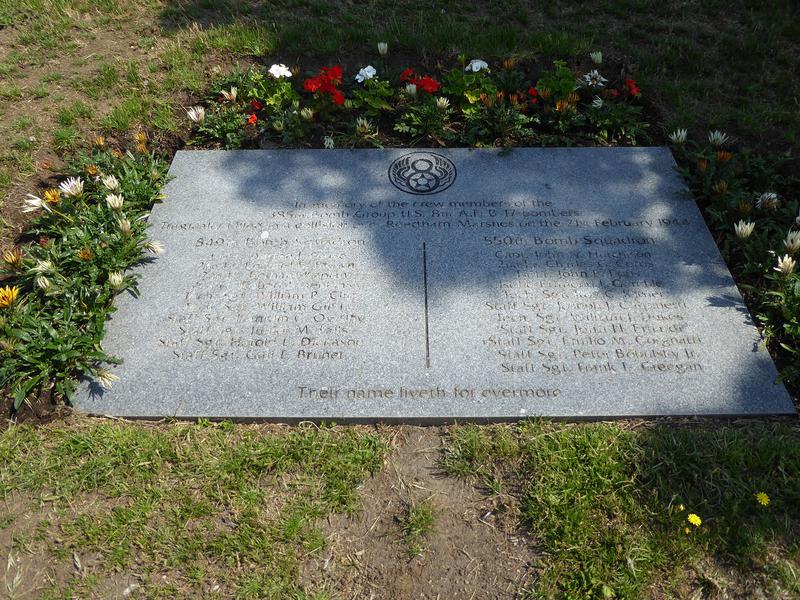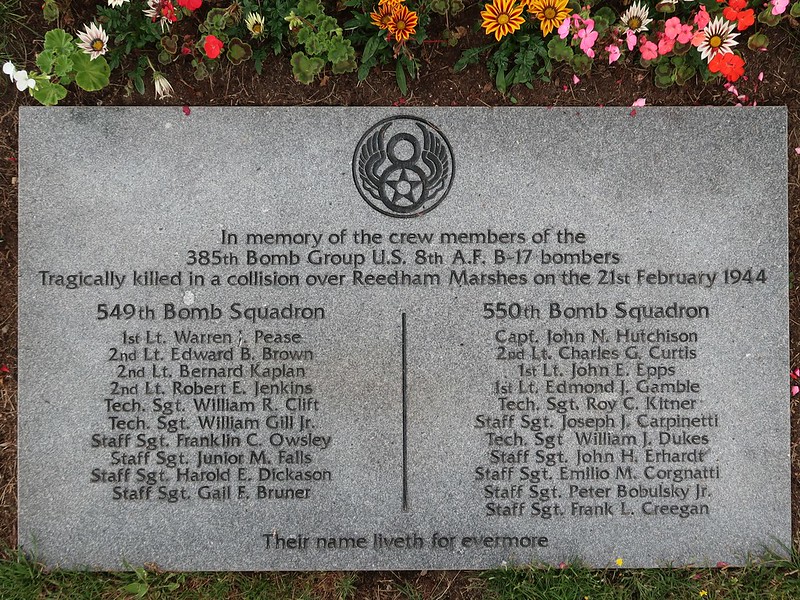B-17 42-37963 and 42-31370 Memorial
Details:
On the north side of Riverside road close to the Reedham war memorial.
A large, rectangular, stone tablet laid onto the ground, inscribed in English in incised and black lettering. The tablet contains the engraved depiction of the 8th Air Force insignia on the top center, followed by the commemoration message then the list of names of the crew of the involved bombers.
On February 21, 1944, the 385th Bomber Group, part of the 4th Bombardment Wing, 8th Air Force was tasked to provide 34 aircraft to carry out a diversionary raid on the Diepholz aircraft depot in N.W. Germany while the main force would attack an aircraft components works at Brunswick in Lower Saxony.
Two of the aircraft that took off from USAAF Station 155 at Great Ashfield, near Bury St. Edmunds, Suffolk to fly to Diepholz were B-17G #42-31370, coded SG-O, from the 550th Bomber Squadron commanded by Capt. John Hutchison and B-17G #42-37963, coded XA-O, from the 449th Bomber Squadron commanded by 1st Lt Warren Pease. The Hutchinson crew were flying on their 25th combat mission and cameraman 'Bud' Creegan was aboard to capture the completion of their tour of duty. Hutchinson's regular bombardier, Ed Gamble, had been ill and his place was taken by Clarence Soucek, but during the briefing, Gamble asked Soucek to swap as he didn't want to miss the 25th mission.
German defenses were light and despite inclement weather, severe damage was inflicted on the target.
At 15:39, the returning bombers crossed the East Anglian coast at a height of 8,000 ft. at 52-43N, 01-41E, north of Great Yarmouth, Norfolk. The cloud base was at 4,000 ft and was up to 3,000 ft thick. The weather conditions were poor and Lt. Col. James McDonald, group leader that day, reduced the danger of collision by ordering the descent through the cloud in three-ship elements.
Capt. Hutchinson led one vic of three aircraft, Lt. Pease flew off his starboard wing and Lt. John Terrace flew on the port wing. Due to his position in the cockpit, Lt. Terrace gave command of his bomber to Lt. Eugene St. John who had a better view of the lead bomber from his co-pilot's seat. In the cloud, with no horizon, each pilot had to fly on their instruments. In the cloud, it is thought that Lt. Pease may have suffered vertigo and lost control of his aircraft which entered a spin. To recover from a spin, a full rudder is applied in the opposite direction and the aircraft is placed in a dive, when the turn-and-slip indicator is centered the aircraft is pulled up and returned to level flight. The flight manual requires that the maneuver must be 'smooth and gradual' but with low height, Pease and his co-pilot were struggling to do this.
When the formation emerged from the cloud, St. John notice Pease's bomber was missing, then the bomber broke cloud in a very steep dive astern of Hutchinson's aircraft. With the altitude now at less than 1,000 ft, Pease flew under his leader and pulled up sharply into the path of the on-coming bomber. The starboard propeller (No. 3) of Hutchinson's bomber tore into the spine of Pease's aircraft completely severing the tail section that fell to earth. Seeing this happening, St. John instinctively broke hard to port to save his aircraft. Continuing upwards, the front two-thirds of Pease's aircraft looped uncontrollably above Hutchinson's aircraft before cutting back onto it and breaking it in half, sending it crashing to the ground at Mill Dyke where it exploded on impact. The tail-less Pease aircraft swung 180 degrees towards the village of Freethorpe, miraculously flying level and making as if to crash land near Decoy Carr. The bomber slithered across the marsh before smashing into a dyke edge and exploding.
All twenty-one crew on the two bombers were killed.
The crew of B-17 #42-37963:
1st Lt. Warren J Pease Pilot
2nd Lt. Edward B Brown Co-Pilot
2nd Lt. Bernard Kaplan Navigator
2nd Lt. Robert E Jenkins Bombardier
Tech Sgt. William R Clift Flight Engineer; Top Turret Gunner
Tech Sgt. William Gill Jr. Radio Operator
Staff Sgt. Franklin C Owsley Ball Turret Gunner
Staff Sgt. Junior M Falls Tail Gunner
Staff Sgt. Harold E Dickason Left Waist Gunner
Staff Sgt. Gail F Bruner Right Waist Gunner
The crew of B-17 #42-31370:
Capt. John N Hutchison Pilot
2nd Lt. Charles G Curtis Co-Pilot
1st Lt. John E Epps, Navigator
1st Lt. Edmond J Gamble Bombardier
Tech Sgt. Roy C Kitner Flight engineer/top turret gunner
Staff Sgt. Joseph J Carpinetti Tail Gunner
Tech Sgt. William J Dukes Radio Operator
Staff Sgt. John H Erhardt Ball turret gunner:
Staff Sgt. Emilio M Corgnati Left Waist Gunner
Staff Sgt. Peter Bobulsky Jr Waist Gunner
Staff Sgt Frank L Creegan Photographer
Source of information: www.flickr.com, www.geograph.org.uk
Source of images: Imperial War Museum War Memorials Register, www.geograph.org.uk, Happy Snapper of www.flickr.com
Monument Text:
In memory of the crew members of the
385th Bomb Group U.S. 8th A.F. B-17 bombers
Tragically killed in a collision over Reedham Marshes on the 21st February 1944
549th Bomb Squadron
1st Lt. Warren J. Pease 2nd Lt. Edward R. Brown 2nd Lt. Bernard Kaplan 2nd Lt Robert D. Jenkins Tech. Sgt William R Clift Tech. Sgt William Gill Jr Staf Sgt Franklin C. Owsley Staff Sgt Junior M. Falls Staff Sgt Harold E. Dickason Staff Sgt Gail F. Bruner | 550th Bomb Squadron
Capt. John H. Hutchison 2nd Lt Charles G. Curtis 1st Lt John L. Epps 1st Lt Edmond J. Gamble Tech Sgt Roy. C. Kitner Staff Sgt Joseph J Carpinetti Tech Sgt William J. Dukes Staff Sgt John H. Erhardt Staff Sgt Emilio M Corgnati Staff Sgt Peter Bobulsky Jr Staff Sgt Frank I. Creegan |
Their name liveth forevermore
Commemorates:
People:
Francis Leo “Frank/Bud,” Jr. Creegan
John Neal “Hutch”, Jr. Hutchison
Units:
385th Bomber Group
549th Bomber Squadron, 385th Bomber Group, Heavy
550th Bomber Squadron, 385th Bomber Group, Heavy
8th Air Force
US Army Air Corps
Wars:
WWII
Other images :



